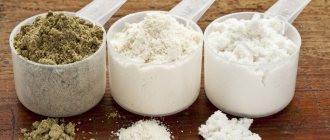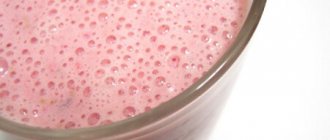There are several forms of protein sold on the sports nutrition market. Read how whey protein isolate differs from whey protein concentrate and which is better.
What is the difference between whey protein isolate and whey protein concentrate and which is better?
Whey protein comes in three main forms: isolate, concentrate, and hydrolyzate (where the whey isolate is further processed). In this article we will tell you the difference between whey protein isolate and whey protein concentrate and which is better.
Let's say right away that both forms contain whey protein, but the isolate, which is made from whey concentrate, is subject to further processing. This helps produce a product with more protein per unit weight than is contained in the concentrate.
Whey Protein and Its Benefits
Whey is one of the two main components of milk, the liquid portion that is separated from the curds (the other main component) during the cheese making process. Whey contains proteins, fats, carbohydrates, vitamins and minerals. Whey protein is produced on its basis.
Due to its complete amino acid profile and rapid absorption, whey protein is arguably the most popular sports nutrition product.
Whey protein has been shown to increase muscle protein synthesis, support fat burning, boost immunity, improve insulin sensitivity, and reduce appetite.
Additionally, it increases the production of glutathione, a major antioxidant in the body.
Drug interactions
Taking protein supplements and medications at the same time does not cause serious consequences. But due to excess calcium content, the isolate reduces the rate of absorption of certain groups of drugs.
Be sure to read: The best steroids for gaining muscle mass: list of drugs, side effects and harm
It is not recommended to use protein isolate and the following medications at the same time:
- Medicines used to treat Parkinson's disease (Levodopa).
- Bone resorption inhibitors (alendronate).
- Antibiotics based on fluoroquinolone and tetracycline (enoxacin, ciprofloxacin, minocycline, etc.).
To minimize the effect of the isolate on drug absorption, it is recommended to take it 2 hours before or 4 hours after taking medications.
How is whey protein made?
The liquid part that remains after passing the milk through the filter, the whey, is dried. The result is a whey protein concentrate containing varying amounts of fat and carbohydrates in the form of lactose. The percentage of protein varies from about 30% to about 80%. This protein contains subfractions such as lactoferrin, immunoglobulins, beta-lactoglobulin, alpha-lactalbumin and others. Many of them have high biological activity and beneficial health effects.
Scientists suggest that these substances must remain in their primary, undenatured form (the 3rd form that exists in nature) in order for all their beneficial properties to be preserved.
What is whey protein isolate?
Whey protein isolate is often overlooked. But don't underestimate it, because isolate contains a huge amount of protein, even more than concentrate. As we said, whey protein concentrate contains about 80% protein, while whey protein isolate contains about 90%.
Simply because of the way isolate is processed, it contains extremely little fat. Whey protein isolate undergoes a process called “cross-microfiltration” to separate the protein from fat, cholesterol and lactose, resulting in an ultra-pure final product. This means that whey protein isolate contains much less fat, cholesterol, carbohydrates, lactose and calories than any other protein shake on the market. Although it is not 100% lactose-free, there is very little of it, so isolate is often recommended for athletes who do not want to consume dairy products.
Nutrition Facts of Whey Protein Isolate
Like whey protein concentrate, whey protein isolate is extremely low in fat. Isolates are available on the market with different percentages of protein. And because the isolate is intensely purified, it is very easily digested and absorbed.
Benefits of Whey Protein Isolate
Isolate is ideal for anyone who is dieting or watching their carbohydrate, calorie and fat intake while also wanting to consume enough protein. This extremely low-carb product means your body can quickly and easily absorb protein and send it straight to where you need it most. The high protein content helps muscles grow and repair so they are ready for the next intense workout.
What is the difference between whey protein isolate and whey protein concentrate?
As whey concentrate is further processed and purified into isolate, protein subfractions (peptides) may degrade and lose their biological activity. It should be noted, however, that the amino acid sequence does not change when the protein is denatured and does not affect its ability to build muscle mass. All large proteins are broken down during digestion into smaller protein chains and individual amino acids (denatured).
The muscles do not care where this process occurs: in the intestines or during protein production.
However, since denaturation can affect the biological activity of certain peptides, whey concentrate is theoretically more beneficial to health than isolate. Moreover, depending on the method used, the isolate can retain a significant amount of bioactive peptides. Thus, when using ion exchange technology to obtain a product with the highest protein content, the protein loses almost all biologically active substances.
Microfiltration methods such as cross-filtration are more expensive but produce a whey isolate with intact bioactive peptides.
Hydrolyzed whey isolate is whey isolate that has been further processed. This produces very small peptides that are quickly absorbed into the bloodstream. Again, this additional processing results in the destruction of health promoting substances.
Rating of the best brands
Many companies are engaged in the production and sale of sports supplements. It's easy to get confused in such diversity.
To purchase high-quality protein and not waste money, you need to focus on time-tested brands of supplements. It is worth choosing products that have been sold for many years and have positive reviews from athletes.
Dymatize Nutrition ISO 100
Dymatize Nutrition ISO 100
This isolate is one of the most popular among athletes and those losing weight. It contains only protein and no carbohydrates. A serving of the supplement provides 28 grams of pure protein and only 106 kcal.
Numerous reviews contain positive ratings and evidence of the effectiveness of the product. An additional advantage is the absence of an unpleasant aftertaste.
Lactalis Prolacta 95
This is a protein from a French manufacturer.
It is a highly purified product and is used for the production of sports and baby food. The isolate contains 95% protein and 1% carbohydrates.
This isolate is made from whole milk, not whey.
Due to this, high nutritional value is maintained. Thanks to special cleaning, the risk of an allergic reaction is reduced. It can be consumed by people with lactose intolerance.
Syntrax Nectar
This isolate is loved by many customers for its variety of flavors.
At the same time, its tastes are pleasant and do not give off excessive chemicals or a metallic aftertaste. Each serving of the supplement contains 24 grams of protein and a minimum of fat and carbohydrates.
Many reviews indicate strong foaming and poor solubility as disadvantages. But these two characteristics are signs of the quality of a good protein.
Be sure to read: Isotonics: what they are, what they are for, the best companies, how to take them, how to make them yourself
Platinum Hydrowhey from Optimum Nutrition
Platinum Hydrowhey by Optimum Nutrition
This is a popular brand of sports supplements. You can find many positive reviews about this isolate; it is sold in all sports nutrition stores.
It contains a mixture of isolate and concentrate, and the amount of fat and carbohydrates is reduced to a minimum. The line of flavors is represented by 22 variants of different combinations, as well as 3 natural additives without sweeteners.
Among the advantages, consumers note good solubility without lumps, even in a regular bottle.
Zero Carb by VPX
In the production of this isolate, cross-flow filtration is used, which ensures a high quality product without a single gram of fats and carbohydrates.
The powder contains 20 grams of protein per serving. Several flavor options help diversify your diet.
Which is better: concentrate or isolate?
When choosing whey protein, it is important to consider your goals, budget, and any allergies you may have. For example, because the concentrate contains significant amounts of lactose, people with lactose intolerance should avoid consuming this product.
Because isolate is more processed, it costs more and may lose many of the health benefits contained in the concentrate.
On the other hand, it contains more protein per serving. This is important for people who follow a low-calorie diet and want to consume as little food as possible. While 5 grams of carbohydrates (per serving of whey concentrate) may not seem like a lot, 2 shakes per day can be the equivalent of half an apple.
Whey isolate, and especially hydrolyzate, is absorbed faster than concentrate and leads to a stronger release of insulin.
This makes isolate a popular choice for post-workout consumption. Whether a high absorption rate provides any benefits for muscle gain is debatable. But for people who want to limit the increase in insulin levels, isolate is unlikely to be suitable.
Summarize
- Whey protein is made up of several fast-digesting proteins and is a common ingredient in dietary supplements. The two common forms are whey isolate and concentrate.
- Whey protein isolate undergoes different processing compared to concentrate, resulting in more protein and less carbohydrates and fat per serving.
- However, these nutrient differences are small and there is no proven difference in the effectiveness of the two types of whey protein.
- Whey isolate can be a good choice for those who carefully limit their intake of fat, carbohydrates, or lactose, although this form of whey protein tends to be more expensive.
- Taking a slightly higher dose of whey protein concentrate can result in the same amount of high-quality protein as taking a smaller amount of whey isolate, but often at a lower cost.
- No matter what type you use, whey is a high-quality protein that can help you reach your daily protein goals.
The article was prepared by experts for informational purposes only. It should not be used as a guide for treating medical conditions and is not a substitute for professional medical advice, diagnosis, or treatment. In case of illness or any symptoms, you should always consult a doctor and not self-medicate.
Tags: Protein
About the author: Larisa Kuts
Board-certified physician specializing in family medicine, geriatrics and integrative medicine. Clinical experience as a physician ranging from disease management to family practice and emergency care.
- Related Posts
- Magnesium: why the body needs it, what foods it contains
- Epigallocatechin gallate (EGCG): properties, dosage, side effects
- Coenzyme Q10 - dosage: How much to take per day?
« Previous entry











